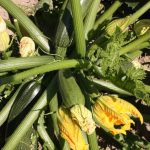Epsom salt is a versatile and widely used mineral compound known for its numerous benefits in various applications. But is Epsom salt good for vegetable gardens? In this article, we will explore the use of Epsom salt in vegetable gardening and delve into its composition to better understand its effects on plant growth and development.
Epsom salt, scientifically known as magnesium sulfate heptahydrate, derives its name from the town of Epsom in Surrey, England, where it was first discovered. It is composed of magnesium, sulfur, and oxygen molecules. The main components of Epsom salt, magnesium (Mg) and sulfur (S), play vital roles in supporting plant health.
Magnesium is an essential nutrient needed by plants for optimum growth and productivity. It is a key component of chlorophyll, the pigment responsible for photosynthesis. Magnesium aids in the absorption and transport of other important nutrients within plant cells. Without sufficient magnesium levels, plants may exhibit stunted growth, yellowing leaves, or decreased fruiting.
Sulfur is another crucial element required by plants for their overall nutrition. It helps in the production of amino acids, proteins, enzymes, vitamins, and chlorophyll. Sulfur deficiency can lead to reduced crop yield and poor quality produce.
In the next sections of this article, we will explore how magnesium and sulfur contribute to vegetable gardening success. We will also discuss the use of Epsom salt as a fertilizer supplement to provide these essential elements to your vegetable plants effectively. So let’s dive deeper into the benefits of magnesium and sulfur for your vegetable garden and uncover whether Epsom salt is truly good for promoting healthy and vibrant vegetables.
The Benefits of Magnesium for Vegetable Gardens
Magnesium is an essential nutrient for the growth and development of vegetable plants. It plays a crucial role in various physiological processes, making it vital for overall plant health. In this section, we will discuss the benefits of magnesium for vegetable gardens and how it contributes to plant growth.
One of the primary roles of magnesium is in the process of photosynthesis. It is an integral component of chlorophyll, the pigment responsible for capturing sunlight and converting it into chemical energy. Without sufficient magnesium, plants cannot produce chlorophyll effectively, leading to stunted growth and poor yield.
Furthermore, magnesium plays a significant role in nutrient absorption within plants. It helps activate enzymes that are responsible for breaking down nutrients in the soil so that they can be absorbed through the roots. As a result, adequate levels of magnesium enhance the efficiency with which plants take up other essential nutrients like nitrogen, phosphorus, and potassium.
Despite its importance, magnesium deficiency is relatively common in vegetable gardens. Some signs of magnesium deficiency include yellowing between leaf veins (interveinal chlorosis), stunted growth, and poor fruit development. Therefore, ensuring an adequate supply of magnesium is crucial for maintaining healthy vegetable plants and maximizing crop yield.
| Application Method | Recommended Quantity | Frequency |
|---|---|---|
| Foliar Spray | 1 tablespoon per gallon of water | Every 2-4 weeks during growing season |
| Soil Incorporation | 1-2 tablespoons per square foot | Once every 6-8 weeks during growing season |
The Role of Sulfur in Vegetable Gardening
Significance of Sulfur in Plant Nutrition
Sulfur plays a vital role in vegetable gardening by contributing to plant nutrition. It is an essential element that is involved in various metabolic processes within plants. Most importantly, sulfur aids in the production of proteins and enzymes, which are crucial for the growth and development of vegetables. These proteins and enzymes are responsible for essential functions such as photosynthesis, respiration, and nutrient uptake.
Link Between Sulfur Deficiency and Decreased Crop Yield
When vegetable plants lack sufficient sulfur, they can experience a range of negative effects on their growth and productivity. One notable consequence of sulfur deficiency is decreased crop yield. This occurs because sulfur is necessary for the synthesis of amino acids, which form the building blocks of proteins. Without adequate sulfur, plants are unable to produce enough proteins to support optimal growth and the development of fruits or vegetables.
In addition to reduced yields, sulfur-deficient vegetable plants may exhibit other symptoms such as stunted growth, yellowing leaves (chlorosis), and delayed maturity. These signs indicate that the plants are not receiving the necessary sulfur levels required for healthy development. Consequently, it is crucial for vegetable gardeners to ensure their plants receive an adequate supply of sulfur to maximize their productivity.
Sourcing Sulfur from Epsom Salt
One effective way to provide sulfur to vegetable gardens is through the use of Epsom salt. Epsom salt contains both magnesium and sulfur, making it an accessible source for supplementing these nutrients in soil or foliar applications. By adding Epsom salt to the garden soil or spraying it on plant leaves as a foliar feed, gardeners can address any potential deficiencies in both magnesium and sulfur simultaneously.
The availability and cost-effectiveness of Epsom salt make it a popular choice among many vegetable gardeners who want a convenient solution for providing sulfur to their plants. However, it is important to note that Epsom salt should not be the sole source of sulfur in a garden.
It is essential to assess the specific needs of the soil and consider other appropriate amendments alongside Epsom salt application. Conducting a soil test can help determine any nutrient deficiencies and guide gardeners in making informed decisions about sulfur supplementation using Epsom salt.
Overall, the role of sulfur in vegetable gardening cannot be overlooked, as it plays a critical role in plant nutrition and overall plant health. Utilizing Epsom salt as an accessible source of both magnesium and sulfur can contribute significantly to maintaining optimal nutrient levels in the soil and promoting robust growth in vegetable gardens.
Epsom Salt as a Fertilizer Supplement
Introduction: Unlocking the Potential of Epsom Salt
Epsom salt, also known as magnesium sulfate, is a versatile mineral compound that has gained recognition for its potential benefits in various applications. It consists of magnesium and sulfur, two essential nutrients that play vital roles in plant growth and development. While Epsom salt is commonly associated with soothing baths, it also holds great potential as a valuable fertilizer supplement for vegetable gardens.
The Power of Magnesium in Plant Growth
Magnesium is an essential mineral that plays a crucial role in the overall health and vitality of vegetable plants. It is a central component of chlorophyll, the pigment responsible for photosynthesis. Inadequate levels of magnesium can result in reduced chlorophyll production and hinder the plant’s ability to convert sunlight into energy.
In addition to its involvement in photosynthesis, magnesium also aids in nutrient absorption by facilitating the movement of other essential elements within plants. This process helps ensure a well-balanced nutrient profile and promotes stronger root development.
Without sufficient magnesium, vegetable plants may exhibit signs of deficiency such as yellowing leaves (chlorosis), stunted growth, or poor fruit development. By supplementing with Epsom salt, gardeners can provide their plants with an accessible source of magnesium to support optimal growth and productivity.
The Role of Sulfur: An Underestimated Nutrient
While often overlooked compared to macronutrients such as nitrogen or phosphorus, sulfur is equally important for plant nutrition. Sulfur is involved in the synthesis of amino acids, vitamins, enzymes, and proteins – all crucial components necessary for healthy plant growth.
By incorporating Epsom salt into your vegetable garden routine, you can ensure an adequate sulfur supply to support optimal protein synthesis. This enhances nutrient utilization efficiency while also promoting robust shoot and root development.
Moreover, adequate sulfur levels are particularly essential for crops with high sulfur requirements, such as members of the onion family (Allium genus), brassicas like broccoli and cauliflower, and legumes. Sulfur-deficient plants may exhibit reduced crop yields, smaller fruits or flowers, and decreased overall vigor. Epsom salt can address this deficiency when applied appropriately, resulting in healthier plants and a more bountiful harvest.
Correct Application of Epsom Salt in Vegetable Gardens
When it comes to using Epsom salt in vegetable gardens, proper application is key to reaping its benefits. Follow these guidelines to ensure you are using Epsom salt correctly and maximizing its potential for your plants.
- Quantity and Frequency: It is important to use Epsom salt in moderation to avoid any negative effects on your vegetable garden. For most vegetables, a general guideline is to apply one tablespoon of Epsom salt per gallon of water or as recommended on the product packaging. It is typically recommended to apply Epsom salt once every month during the growing season.
- Foliar Spray: One popular method of applying Epsom salt is through foliar spraying, where the solution is applied directly to the leaves of the plants. This allows for faster absorption by the plants. Fill a spray bottle with the diluted Epsom salt solution and evenly mist it onto the foliage of your vegetable plants. This method can be particularly beneficial for treating magnesium deficiency symptoms quickly.
- Soil Incorporation: Another way to use Epsom salt is by incorporating it into your soil during planting or as a top dressing. Dig a small trench around each plant or sprinkle Epsom salt around the base of established plants, then lightly mix it into the soil without damaging the roots. Water thoroughly after application to help dissolve and distribute the salts.
It’s important to note that while Epsom salt can be beneficial for vegetable gardens, it should not be used as a substitute for proper soil preparation and regular fertilization. Before incorporating Epsom salt into your gardening routine, conduct a soil test to determine if there are any deficiencies or imbalances that need attention. This will help you make informed decisions about the specific amendments your soil and plants may require.
In addition to using Epsom salt correctly, it’s also essential to consider other soil amendments and best gardening practices. Remember that Epsom salt is not a cure-all solution for every gardening issue, and its benefits may vary depending on your specific soil composition, plant varieties, and regional conditions. By following correct application methods and considering the overall health of your garden, you can effectively use Epsom salt to enhance the growth and productivity of your vegetable plants.
Common Misconceptions and Cautionary Notes
There are several common misconceptions surrounding the use of Epsom salt in vegetable gardens that need to be addressed. One such misconception is that Epsom salt can replace regular fertilizers entirely. While it does provide essential nutrients like magnesium and sulfur, it should not be used as a standalone fertilizer. Epsom salt should be used in conjunction with a balanced fertilizer to ensure adequate nutrition for vegetable plants.
Another misconception is that more is better when it comes to using Epsom salt. It is important to follow the recommended quantities and frequency of application to avoid overuse. Excessive amounts of Epsom salt can lead to nutrient imbalances in the soil and hinder plant growth rather than promote it. It is always best to follow instructions or consult with a gardening expert for proper usage guidelines.
Furthermore, it is crucial to consider other soil amendments and understand the specific needs of your vegetable garden before relying solely on Epsom salt. Every garden has unique soil composition, pH levels, and nutrient requirements. Conducting a soil test can provide valuable insights into the specific deficiencies or imbalances present, allowing you to tailor your fertilizer regimen accordingly.
Overall, while Epsom salt can be beneficial when used correctly, it is important to dispel these misconceptions and exercise caution in its utilization. By understanding its role as a supplement rather than a substitute for regular fertilizers, following recommended application guidelines, and considering other soil amendments, gardeners can maximize the benefits of using Epsom salt without any negative consequences.
| Myth | Reality |
|---|---|
| Epsom salt can replace regular fertilizers entirely. | Epsom salt should be used in conjunction with a balanced fertilizer. |
| More Epsom salt is better. | Follow recommended quantities and frequency of application to avoid overuse. |
| Epsom salt is the only soil amendment needed. | Consider other soil amendments and conduct a soil test for specific needs. |
Case Studies and Success Stories
Many vegetable gardeners have experienced success using Epsom salt as a supplement in their gardens. These case studies and success stories highlight the numerous benefits observed when incorporating Epsom salt into vegetable gardening routines. From increased yields to healthier plants, the effectiveness of Epsom salt is evident.
One gardener, Sarah, saw remarkable results after using Epsom salt in her tomato garden. She reported that her plants appeared greener and more vibrant than ever before. Not only did the tomatoes taste better, but she also noticed an increase in yield compared to previous years. Sarah attributes these positive outcomes to the magnesium content in Epsom salt, which plays a vital role in plant growth and development.
Another success story comes from Mark, who grows a variety of vegetables in his backyard garden. After adding Epsom salt to his soil at the recommended dosage, Mark found that his plants seemed to thrive even during periods of extreme heat and drought. He credits the sulfur component in Epsom salt for helping his plants withstand stressful environmental conditions and produce optimal harvests.
These real-life examples demonstrate how Epsom salt can provide significant benefits to vegetable gardens. Increased yields, improved flavor, enhanced plant health – these are just a few of the advantages that gardeners have experienced firsthand by incorporating this valuable fertilizer supplement. Whether you’re a novice or experienced gardener, considering the use of Epsom salt may be worth exploring to enhance your vegetable garden’s overall performance.
Conclusion
In conclusion, Epsom salt can be a valuable addition to vegetable gardens. Throughout this article, we have explored the composition and benefits of Epsom salt, specifically its main components magnesium and sulfur. Magnesium plays a vital role in plant growth and development, aiding in photosynthesis and nutrient absorption. Sulfur is essential for the production of proteins and enzymes, which are crucial for overall plant health.
As a fertilizer supplement, Epsom salt provides a convenient and cost-effective way to deliver these essential nutrients to vegetable plants. Its correct application is important, considering dosage and frequency based on specific garden needs. Whether applied as a foliar spray or incorporated into the soil, Epsom salt can help address deficiencies and improve crop yield.
While misconceptions surrounding the use of Epsom salt exist, it is important to approach its usage with caution. Overuse or misuse can lead to adverse effects on plants and soil health. Therefore, conducting soil tests regularly and considering other soil amendments are necessary steps in maintaining a balanced nutrient profile.
Real-life case studies and success stories from vegetable gardeners demonstrate the effectiveness of Epsom salt in promoting healthier plants and increased yields. These testimonials further support the idea that incorporating Epsom salt into your gardening routine can bring positive results.
To answer the question posed in the title of this article, yes, Epsom salt is indeed good for vegetable gardens when used appropriately. Its ability to provide magnesium and sulfur alongside its convenience make it a valuable supplement for promoting optimal plant growth. Consider integrating Epsom salt into your gardening practices to enhance the overall health and productivity of your vegetable garden.

If you’re looking to get into vegetable gardening, or are just looking for some tips on how to make your current garden better, then you’ve come to the right place! My name is Ethel and I have been gardening for years. In this blog, I’m going to share with you some of my best tips on how to create a successful vegetable garden.





